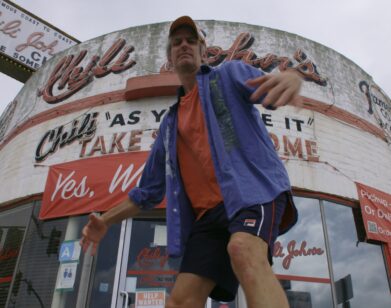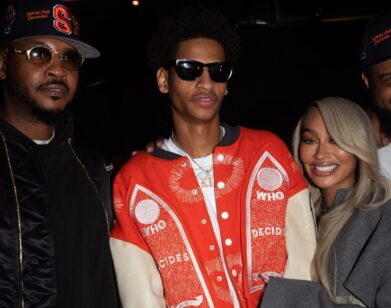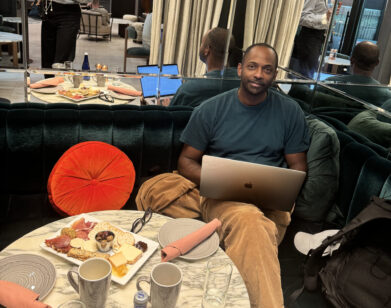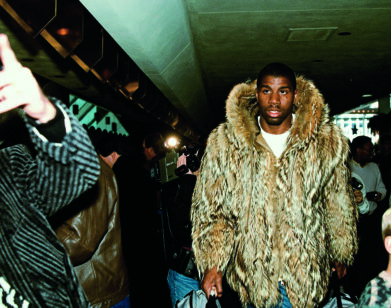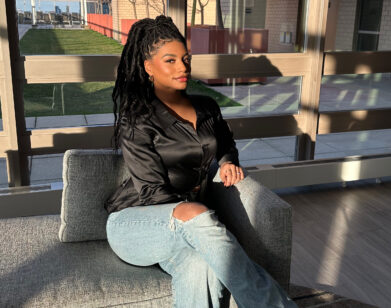Certified Dad Stephen Malkmus Reveals the Secrets to a Life of Fantasy Sports and Fly Fishing

Stephen Malkmus is a quarter-century removed from the time he offered up the simple aphorism, “You gotta pay your dues before you pay the rent.” One is curious if the sentiment, taken from the song “Range Life” off Pavement’s 1994 classic Crooked Rain, Crooked Rain was fully clear to Malkmus at the time, a 27-year-old embarking on the halcyon festival circuit that was Lollapalooza. Paying rent, dodging the painful fall-out of relationships by heading to new cities, finding a wife, having kids, looking for schools for said kids, fly fishing with said wife — all of these might not have been the life young Malkmus was sardonically pining for. Yet, in 2019, the Portland-based “dad of indie-rock” is at home on his range, settled down, dues having been paid in full. His life, in some ways is an example to anyone who feels that their remaining adult years are sloughing off into a mire of sports fandom, vacation days, and children’s birthday parties. He’s also offering us another album, too — this one called Groove Denied. His first “solo” album since 2001 is evidence that the 52-year-old songwriter hasn’t gone soft out there, he’s gone in. While the album is billed as an “electronic album” that was, according to lore, rejected by his longtime label, Matador Records, his new songs are proof that “slacker rock” as we know it has only really made sense in his hands. That is, in the hands of someone who never knew what they wanted — be it settling down, fucking with synthesizers, aging gracefully, riding further on it into the cosmic whatever of one’s life. In a conversation with his friend David Chang, the Momofuku chef and host of Netflix’s Ugly Delicious, Malkmus doesn’t really look back on anything in the rearview mirror. There’s only now — fantasy sports, his family, and yes, fly fishing. Maybe some music, too. “Won’t somebody come get me?” Malkmus asks in one of Groove Denied‘s more existential moments. “Out on this ledge eternal?” Perhaps, it’s better we leave him out there. —NATHAN TAYLOR PEMBERTON
———
STEPHEN MALKMUS: Do you have any restaurants in an airport yet?
DAVID CHANG: No, but honestly that’s where I think food’s gonna get better — at all the places where it’s traditionally bad. People wanna eat well, man. They’d rather eat well everywhere. No one wants to eat shitty food. Airports are the last frontier for food, besides hospitals and public schools. They’re gonna be good in the next decade.
MALKMUS: I don’t know what the restrictions are with modern technology, but with a little rethinking it, you can probably make it happen beyond security.
CHANG: The world at large has good food at the airports. Everywhere except for America. Singapore’s really good. Japan’s really good. All Southeast Asian airports have tremendous food. I don’t know why. They never had a food culture where food wasn’t gonna be good for everyone.
MALKMUS: What do you think about food in the internet era? I was just thinking about the idea of utility cooking at my house. I don’t know if it makes the experience better or worse because you can really quickly dial-up a recipe in your house on your phone.
CHANG: I’m the furthest thing from knowing anything about music, but apps like Blue Apron have got to be a bit like Autotune for a musician. It can make anyone sound pretty good. These recipes out there that are pre-measured can make the food sort of delicious, but no one knows exactly why it’s good. I think that’s been the problem. People are cooking more at home than ever before, and I think that’s why restaurants are a bit in trouble. The only way you can do it is by making something great, like an experience. People that wanna go see you and the bands that they like — it’s not because they don’t know the music. I feel like, as a fan of music, you wanna go to experience it, you know?
MALKMUS: A vibe or an atmosphere has gotta be created in some way. It’s an overused term, maybe, but you know that’s what is going to keep you coming back — not like a perfectly prepared food. It’s all the intangibles. I don’t know if you feel this way, but I can settle for an inferior food product, though I want to like the place. I want to like the people. You want to feel good in there. Not like you’re being data mined for what you want.
CHANG: I think eating stuff that you can’t cook at home or get delivered is the food that people want. That’s almost like the equivalent of a concert. When we filmed in China, I saw that one of the hottest trends in Beijing and Shanghai is crawfish houses. It’s fucking crazy. They’re packed full of Chinese kids because they want to eat spicy crawfish. I was like, “What the fuck is going on? This is so crazy.” And it hit me. You can’t get this delivered. You can’t cook this at home.
MALKMUS: Are they Western-themed, like Houston looking?
CHANG: No, they’re all designed on Chinese acid trips. Really crazy looking places. They’re all packed and people love it. They love that they can go out with their friends, get something delicious and interactive, and they can all share in that experience. In some ways, it’s like all the technology, and all the shit that’s out there in food, is forcing people to go back to the basics.
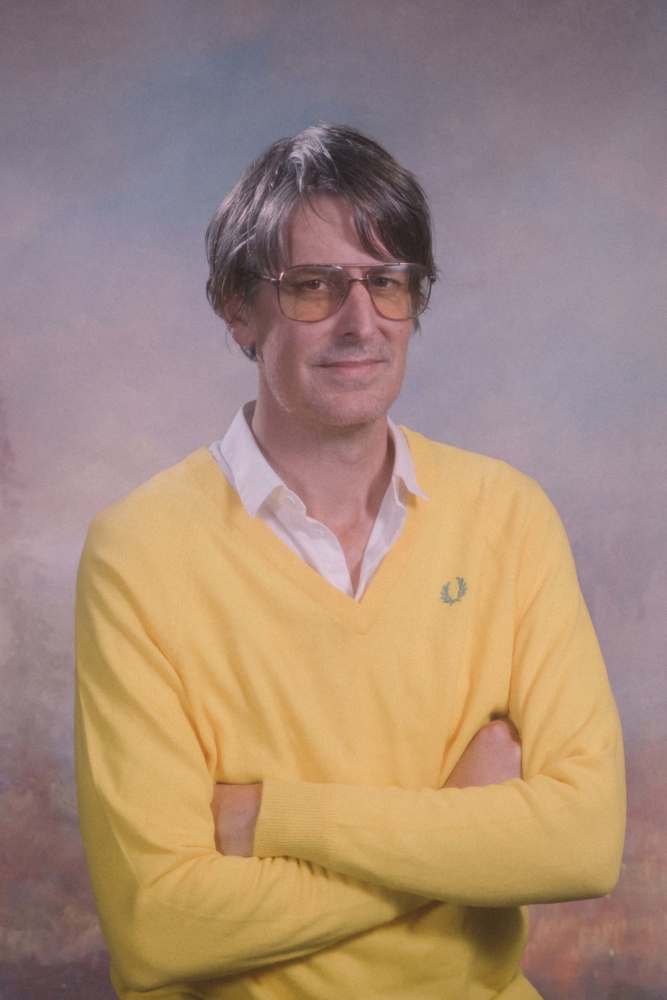
Photo by Robbie Augspurger.
PEMBERTON: When was the last time the two of you ate together? What city was it in?
CHANG: Australia, maybe?
MALKMUS: Yeah, I went to your place in the casino. We were on the Pavement Reunion tour.
CHANG: I felt so bad.
MALKMUS: Why? Because you were just getting started?
CHANG: I didn’t know what the fuck was going on. I thought about that I don’t know what happened. I was like, “Shit, I should never have even had you guys come over.” It’s just so weird.
MALKMUS: Dude, we loved it. The band was so happy. It was great. We went to a place together with Mark [Ibold] in Melbourne that I can’t remember. It was really good.
CHANG: Dainty Sichuan. Really spicy Sichuan food, yeah.
MALKMUS: You live in Los Angeles now, right?
CHANG: No, shit’s been crazy. Everything’s changed. I finally got married. I got my head out of my ass, and I’ve been finally growing up a little bit. We’re expecting a kid now. First time father, next week.
MALKMUS: Congratulations. That’s awesome.
CHANG: Would you ever move back to New York, or are you in Portland for good?
MALKMUS: Totally. We would. We have two girls, though, and a lot of stuff is easier here. Getting into schools and some of the driving. It’s somewhat wholesome. Although, I mean, the public schools aren’t, like, safe. Anything could happen. You could get into drugs or any of these kind of things. It’s still going on, like it was in the 1980s or whatever. But I love New York. I still do. I feel at home there. It was really welcoming to me as a total suburban nerd back in the ’90s. I don’t forget that you did me right.
CHANG: You were so ahead of the curve, man. Everything that’s cool now, you were already there before anything happened. Like, Williamsburg, and then Jersey City.
MALKMUS: Your pocketbook follows cool because really those were the places that we could afford to go, you know. They were good. I mean we could’ve gone to the deep Bronx or something. That would’ve been cheaper, but it was too much. Do you like to fly fish still? You’re just getting married.
CHANG: Of course.
PEMBERTON: When did you both start fly fishing?
MALKMUS: Yeah, how did you get into it, David?
CHANG: I answered phones at Jackson Hole Resort Lodging in Wyoming after I finished college. I worked the midnight shift because I didn’t have to talk to anyone, and I never had to answer the phones. That summer, during the daytime, after waking up from a hangover or whatever where I was drinking, I just would go down and start fucking around with my friend’s fly fishing shit. I did it every day just to kill time before I had to work.
MALKMUS: That’s cool. My uncle was pretty into it, and he belonged to a fly fishing club in Utah. It was WASP-y, but it had seen better days. The club had kinda been taken over by these Utah people that were kinda Utah-y, no disrespect. We went, and it was fun. After that I just started messing around with it on my own.
CHANG: I’ve heard these rumors that the guy who started Matador [Records] is a really good fisherman because he goes for striped bass.
MALKMUS: Chris [Lombardi, founder of Matador]?
CHANG: Yeah.
MALKMUS: That’s a great rumor because really it went like him saying, “Hey, Steve, I know this place in Staten Island. We’ll leave at five in the morning, and we’ll catch some tuna. Then, we can go to Peter Luger’s afterwards. All in one.” So, we went out, and these Staten Island dudes threw some chum in the water, and you just cast into it. You catch a bunch of fish that you throw back, and maybe some bass on the side as you’re going out. As far as I know, that’s where that legend got made. I know that he’s impervious to sea sickness, which I think is kinda cool. I went fishing with him another time, and two people threw up. I was on the edge of throwing up, and he was just cruising, you know? He didn’t take anything. So that’s the most badass thing about his fishing that I know.
CHANG: I’m just gonna spread that urban legend that he’s the greatest angler that New York City has ever known.
PEMBERTON: As far as sporting goes, the two of you are in the same fantasy basketball league, right? What’s league named?
MALKMUS: It’s called “University of Flugelhorn Tech.” It’s meaningless, but at least it’s not a pun or something. A lot of people like to do these puns with their league names, and they show their dad-ness — even if they’re 20-something, or childless.
CHANG: For real.
MALKMUS: I think you have the team to beat in our fantasy basketball league this year, David. You did an amazing job drafting this year. You’re a good chef and shit like that, but you picked up Luka Doncic, which is brilliant. That was not a last-place move. That was like, “I’m gonna try to win this thing.”
CHANG: I’ve said this to no one actually, but as great of a musician as you are — one of my favorites, obviously — you might be the greatest fantasy player I’ve ever seen in my life.
MALKMUS: There’s a lot of luck involved. It can turn. I used to do fantasy football, and I still do it, but I don’t care anymore. I just don’t have time. I like basketball better and baseball. But, I thought I was hot shit, and then I have a total dry streak of five years. You’ve seen it. So, you know, it’s a short sample size, David. But, thanks. I am getting better at it.
CHANG: You’re way too modest. I had no idea how good you are at this. You’re in is a very competitive league with Steve Alexander from Rotoworld!
MALKMUS: Wait, who?
CHANG: You are. There’s a lot of good players.
[MALKMUS drops from the call.]
PEMBERTON: I think we lost Stephen.
CHANG: He’ll call back in. He’s just so good it proves to me that, if Stephen wanted to do anything, he’d be good at it. He’s just got that personality.
MALKMUS: Hey, sorry. Are you there? I don’t know what happened. It’s because I started talking about Anthony Davis. He brings everything down.
PEMBERTON: Maybe we’ll have to stop talking about basketball, then.
MALKMUS: What? You don’t think that’s the ticket for Interview?
CHANG: The way you play fantasy basketball, Stephen, is literally like the Golden State Warriors. You’ve created a template that I’m just trying to follow. You don’t understand. For years, it was like sorting out data. It was like A Beautiful Mind. I was like, “How is he choosing these players? What is going on? There’s no reason!” You should moonlight as a fucking fantasy sports guru. I’m just letting you know. You should print this in the magazine: If you’re Disney or ESPN, if you don’t give Stephen a fucking show, you’re an idiot. You’re just an idiot. It’s almost like Being John Malkovich. I think that the second half of the career and your life shouldn’t be music at all. Just fantasy sports.
MALKMUS: It’s not real enough. How about, like, saving the world in some way? But I know what you mean.

